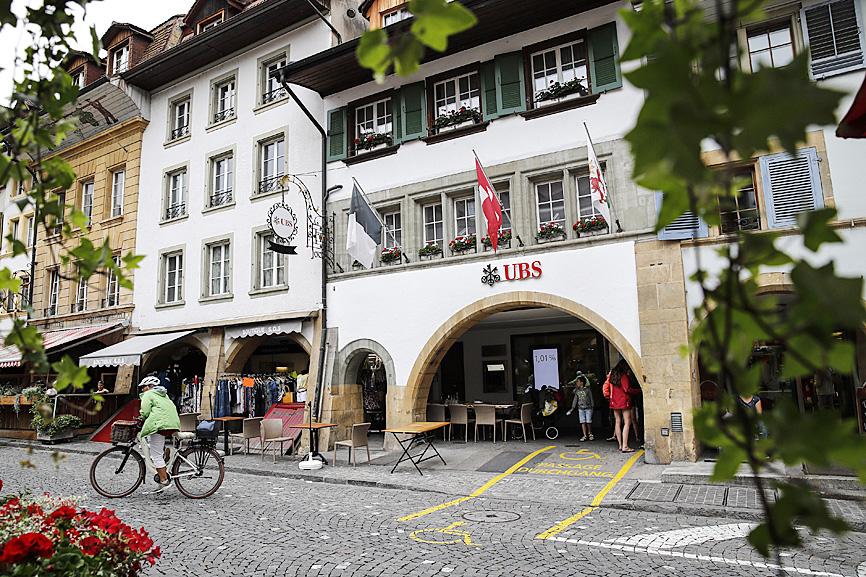UBS Group AG yesterday signaled that the worst hit of the COVID-19 pandemic on its balance sheet might be over, prompting the bank to consider reviving shareholder payouts after costs to cover soured loans peaked in the first half.
The Swiss bank — while warning there was plenty of uncertainty ahead — attracted US$9 billion of net new money at its private banking business in the second quarter and posted higher transaction-based income as clients boosted trading in volatile markets.
While credit loss expenses are to remain high in the coming months, they would not match the US$540 million posted in the first half, it said.

Photo: Bloomberg
UBS, which serves mostly wealthy clients and does not do a lot of corporate lending, has been relatively shielded from the defaults which prompted Wall Street firms to set aside tens of billions of dollars to cover an expected wave of bankruptcies.
At the same time, it also benefited from the trading bonanza that saw Wall Street firms post record profits — fixed-income trading revenue at the investment bank more than doubled.
The issue of dividend payments and buybacks has been controversial because of the relief that banks have received from regulators to help them withstand the crisis.
UBS and Credit Suisse Group AG were among the last European firms to delay their dividend after the Swiss regulator followed its European counterparts by pressuring lenders to suspend payouts because of the economic uncertainty.
UBS chief executive Sergio Ermotti said that he is now confident that the bank would pay the second tranche of its dividend in the second half. UBS stopped a US$450 million buyback program in March because of the pandemic.
The bank added US$272 million to its loan loss provisions during the second quarter, slightly below estimates, with Europe starting to reopen businesses.
The bank said that the majority of its credit exposures are of high quality, in part reflecting the wealth of its home nation.
The wealth unit, the bank’s largest contributor of revenue, said that net new money was positive across the regions.
Recurring net fee income declined 8 percent at the wealth management business, mostly reflecting lower invested assets at the beginning of the quarter.
Profit at the wealth unit was supported by a strong performance in Asia, which made up for a 37 percent drop in profit year-on-year for the business in the Americas.
Ermotti, who is to step down at the end of October, has scaled down trading after the financial crisis, though the bank still has a sizeable equities business.

SEMICONDUCTORS: The German laser and plasma generator company will expand its local services as its specialized offerings support Taiwan’s semiconductor industries Trumpf SE + Co KG, a global leader in supplying laser technology and plasma generators used in chip production, is expanding its investments in Taiwan in an effort to deeply integrate into the global semiconductor supply chain in the pursuit of growth. The company, headquartered in Ditzingen, Germany, has invested significantly in a newly inaugurated regional technical center for plasma generators in Taoyuan, its latest expansion in Taiwan after being engaged in various industries for more than 25 years. The center, the first of its kind Trumpf built outside Germany, aims to serve customers from Taiwan, Japan, Southeast Asia and South Korea,

POWERING UP: PSUs for AI servers made up about 50% of Delta’s total server PSU revenue during the first three quarters of last year, the company said Power supply and electronic components maker Delta Electronics Inc (台達電) reported record-high revenue of NT$161.61 billion (US$5.11 billion) for last quarter and said it remains positive about this quarter. Last quarter’s figure was up 7.6 percent from the previous quarter and 41.51 percent higher than a year earlier, and largely in line with Yuanta Securities Investment Consulting Co’s (元大投顧) forecast of NT$160 billion. Delta’s annual revenue last year rose 31.76 percent year-on-year to NT$554.89 billion, also a record high for the company. Its strong performance reflected continued demand for high-performance power solutions and advanced liquid-cooling products used in artificial intelligence (AI) data centers,

Gasoline and diesel prices at domestic fuel stations are to fall NT$0.2 per liter this week, down for a second consecutive week, CPC Corp, Taiwan (台灣中油) and Formosa Petrochemical Corp (台塑石化) announced yesterday. Effective today, gasoline prices at CPC and Formosa stations are to drop to NT$26.4, NT$27.9 and NT$29.9 per liter for 92, 95 and 98-octane unleaded gasoline respectively, the companies said in separate statements. The price of premium diesel is to fall to NT$24.8 per liter at CPC stations and NT$24.6 at Formosa pumps, they said. The price adjustments came even as international crude oil prices rose last week, as traders

SIZE MATTERS: TSMC started phasing out 8-inch wafer production last year, while Samsung is more aggressively retiring 8-inch capacity, TrendForce said Chipmakers are expected to raise prices of 8-inch wafers by up to 20 percent this year on concern over supply constraints as major contract chipmakers Taiwan Semiconductor Manufacturing Co (TSMC, 台積電) and Samsung Electronics Co gradually retire less advanced wafer capacity, TrendForce Corp (集邦科技) said yesterday. It is the first significant across-the-board price hike since a global semiconductor correction in 2023, the Taipei-based market researcher said in a report. Global 8-inch wafer capacity slid 0.3 percent year-on-year last year, although 8-inch wafer prices still hovered at relatively stable levels throughout the year, TrendForce said. The downward trend is expected to continue this year,